Machine learning has been widely applied to obtain statistical understanding and rational design of advanced materials by mapping out the processing - (micro)structure - property – performance relationships. In this work, focusing on the structure - property relationships, I am going to demonstrate the concept of inverse design and to showcase how it can be carried out in three different flavours, i.e., high-throughput (HTP) combinatorial computation, Bayesian optimization, and generative deep learning. For the HTP screening, it is essential to implement and execute automatized high-throughput workflows to evaluate essential properties. I am going to show how we are using such workflows to screen for permanent magnets, magnetocaloric, photovoltaic, and thermoelectric materials, with a recent extension to magnetic high entropy alloys. Furthermore, in order to explore the vast design space more efficiently, we propose using Bayesian optimization as an efficient ranking machine with reliable recommendations by balancing exploration and exploitation. Such an approach has been applied for various experimental characterization techniques such as x-ray absorption spectroscopy, high-resolution transmission electron microscopy, and inelastic neutron scattering. In particular, I am going to demonstrate how a closed-loop adaptive design strategy can be implemented and applied to optimize functional materials. Last but not least, I am going to give an overview on how generative deep learning can be applied to predict novel crystal structures and microstructures based on our recent implementation using the generative adversarial network and diffusion models.
As part of the presentation, there will be a teaching demonstration on the topic
"Einstein and Debey Model".

